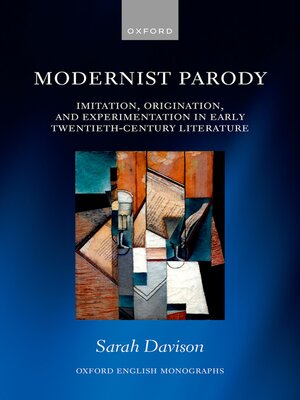Modernist Parody
ebook ∣ Imitation, Origination, and Experimentation in Early Twentieth-Century Literature · Oxford English Monographs
By Sarah Davison

Sign up to save your library
With an OverDrive account, you can save your favorite libraries for at-a-glance information about availability. Find out more about OverDrive accounts.
Find this title in Libby, the library reading app by OverDrive.



Search for a digital library with this title
Title found at these libraries:
| Loading... |
Parody often stands accused of producing derivative art deficient in taste and skill. But in the hands of writers such as Ezra Pound, Wyndham Lewis, T. S. Eliot, James Joyce, Ford Madox Ford, and Virginia Woolf, the mode engendered revolutionary self-reflexive, critical, and creative practices that were crucial to the development of truly modern art. This book contends that the jauntiness, verve, and daring of high modernism is fundamentally parodic. It argues that
parody is central to the whole modernist project, even to supposedly earnest movements such as Imagism, and not just to the extreme avant-garde antics of Dada. As a literary technique, parody provided the means for modernists of many stripes to learn their craft, sharpen their historical sense, define
themselves as post-Victorians, and respond to sources of inspiration while composing. It offered a ready method to laugh at folly, amuse friends, criticize opponents, spike enemies, and transgress conventions. Being double-coded, parody proved a powerful weapon in the culture wars, enabling modernists to present and simultaneously challenge prevailing ideologies in all their historically determined complexity. Its fundamentally dialogic and palimpsestual form exposed the limitations of
naïve mimesis, insisting that literature is always language in unstable play, while simultaneously foregrounding the relational structures that underwrote the modernists' paradoxical claims to originality and modernity. As a principle of continual genesis-and a spur to the production of yet more forcefully
experimental art-parody therefore became the modernists' primary reflex as they negotiated their position in literary culture and made it new.






